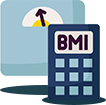By Nehha, Certified Keto Coach & Nutrition Expert | Wellness with Nehha
Introduction
In a world full of fad diets, food guilt, and constant body image pressures, developing a healthy relationship with food has become more important than ever. A positive connection with food not only supports physical health but also improves mental well-being, emotional balance, and long-term lifestyle sustainability.
As a nutrition coach, I’ve seen how shifting your mindset around food can be just as powerful as the food itself. In this blog, let’s explore how to truly heal your relationship with food—without rules, guilt, or restriction.
What Does a Healthy Relationship with Food Look Like?
- You eat without guilt or shame
- You’re able to enjoy all foods in moderation
- You listen to your body’s hunger and fullness cues
- You don’t use food as a punishment or reward
- You focus on nourishment rather than numbers
1. Stop Labeling Foods as “Good” or “Bad”
Food isn’t moral. A cookie isn’t “bad,” just like a salad isn’t “good.” When we assign morality to food, we internalize guilt every time we eat something outside the “clean” category. Instead, think in terms of frequency: some foods you eat more often, others less often—but all can coexist.
2. Practice Mindful Eating
Mindful eating means being present with your plate. Slow down. Notice the texture, flavor, aroma, and satisfaction level of your food.
Try this:
- Eat without screens
- Chew slowly and pause between bites
- Ask yourself: “Am I truly hungry or just emotionally triggered?”
3. Ditch the “All or Nothing” Mentality
Many of us swing between extremes—strict dieting one week, emotional eating the next. Real progress lies in the 80/20 approach: 80% nourishing foods, 20% flexibility. This mindset builds consistency without burnout, which is exactly what I teach inside my wellness programs.
4. Understand Emotional Eating Triggers
We often turn to food when stressed, lonely, or overwhelmed. While emotional eating isn’t “bad,” it’s helpful to identify when you’re truly hungry vs. when you’re soothing an emotion.
Tip: Keep a journal. Track how you feel before and after eating. You’ll start seeing patterns—and solutions.
5. Respect Your Body’s Cues
Your body is smart. It tells you when it’s hungry, full, tired, or bloated—but only if you listen. One powerful practice? Honoring hunger without delay and stopping at comfortable fullness, not stuffed discomfort.
6. Nourish, Don’t Punish
Food is not a punishment or a reward. It’s fuel, pleasure, culture, and connection. Instead of over-exercising to “burn off” a meal, or skipping meals to compensate, focus on nourishing your body consistently.
7. Learn from Professionals Who Guide Without Guilt
There’s a lot of noise out there. If you’re constantly confused by diet trends, calorie-counting apps, or contradicting advice—work with someone who understands nutrition holistically.
At Wellness with Nehha, I help you balance science, mindset, and sustainable habits. My plans are always designed with flexibility, food freedom, and long-term wellness in mind.
Final Thoughts: Food is Not the Enemy
A healthy relationship with food isn’t built overnight—it’s a journey. But when you start treating your body with kindness, nourish without extremes, and release guilt… something shifts.
You don’t just eat healthier—you feel empowered.
Want Support on This Journey?
I’d love to guide you. Explore my consultations, detox programs, or recipe library to begin healing your relationship with food, one balanced meal at a time.

